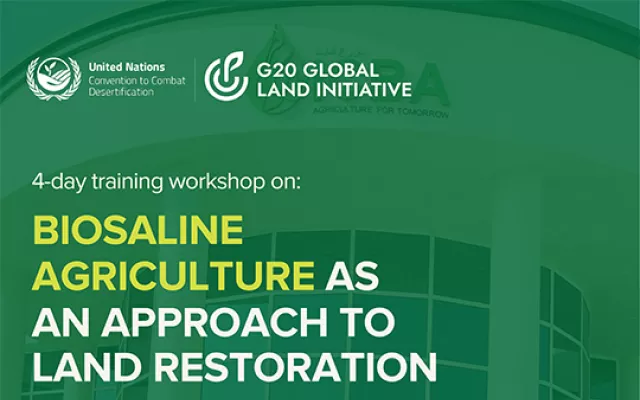ICBA's quinoa genotypes can boost agriculture in Ethiopia's salt-affected areas - study
ICBA's quinoa genotypes are just the job for addressing the problem of low agricultural productivity in Ethiopia’s salt-affected areas, a recent study by the International Center for Biosaline Agriculture (ICBA) and the Ethiopian Institute of Agricultural Research (EIAR) says.
The genotypes can help reclaim salt-affected areas and thus improve food security and nutrition in the country.
This is good news for a nation which ranks first in Africa in terms of the territory affected by salinity. It is estimated that some 11 million hectares of land are salinized, causing agricultural losses of 10-80 percent.
The study was conducted under the five-year project titled “Rehabilitation and Management of Salt-affected Soils to Improve Agricultural Productivity (RAMSAP)” in Ethiopia. Launched in 2016, the project is implemented by ICBA and its national partners with the financial support of the International Fund for Agricultural Development (IFAD).
As part of the study, a team of researchers from ICBA and EIAR evaluated five genotypes (ICBA-Q1, ICBA-Q2, ICBA-Q3, ICBA-Q4, and ICBA-Q5) for salinity tolerance, nutritional value and yield under different soil salinity conditions. The experiments were carried out in open field and greenhouse conditions. The researchers found that three genotypes (ICBA-Q3, ICBA-Q4 and ICBA-Q5) could grow satisfactorily under soil salinity levels of up to 20 deciSiemens per meter (dS/m) and overall showed promising results in terms of biomass production and grain yield in the country’s dry and hot conditions.
According to Dr. Asad Sarwar Qureshi, a senior irrigation scientist at ICBA and the lead author of the study: "The rising global demand for nutritious and healthy food has challenged scientists to look for alternate crops like quinoa, especially for the world's marginal areas, where agricultural production is inefficient due to unfavorable climatic conditions, low soil fertility, soil and water salinity, and lack of good quality irrigation water. Quinoa is rich in nutrients, tolerant of salinity, and requires much less water than major staple crops. That is why ICBA, along with its partners, has been introducing the crop in many countries of the Middle East and North Africa region, and Central Asia. In Ethiopia, the farmers who cultivated quinoa in their fields as part of the study were happy and expressed a great interest in the crop because it provides fodder for animals and healthy grains for human consumption."
As the country plans to set up large-scale irrigation schemes without adequate drainage facilities, there is a high risk that soil salinity will worsen. So it is important to reclaim saline soils and bring them back into use, and prevent good soils from salinization.
In this regard, it is also necessary to develop agricultural value chains for salt-tolerant food and forage crops to increase food production in salt-affected areas and help smallholder farmers to feed their families and livestock.
ICBA is now collaborating with the Ministry of Agriculture of Ethiopia and EIAR to prepare a strategy for expanding quinoa production in Ethiopia. Several national agricultural research institutes have also joined the efforts and started producing quinoa seeds for free distribution among farmers.









